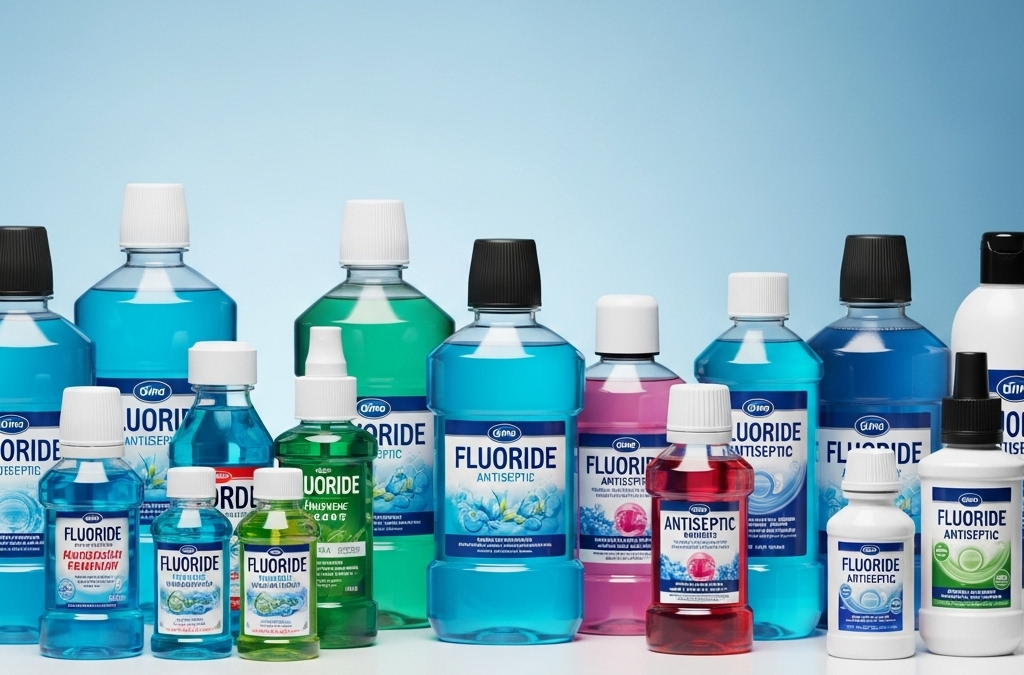- Hook: After brushing and flossing, is swishing with mouthwash just a breath freshener, or does it offer real dental benefits?
- Acknowledge: Many people use mouthwash daily but aren’t sure if it’s truly essential or just an extra step.
- State the post’s purpose: This article will dive deep into the world of mouthwashes, exploring their different types, scientifically-backed benefits, proper usage, and when they are truly necessary for optimal oral health.
Understanding Mouthwash: Beyond Fresh Breath
- What is Mouthwash?
- Definition and its primary role in oral hygiene.
- Distinction between cosmetic and therapeutic mouthwashes.
- Common Ingredients:
- Antiseptics (Chlorhexidine, Cetylpyridinium Chloride – CPC, Essential Oils like Listerine): How they kill bacteria.
- Fluoride (Sodium Fluoride): Its role in cavity prevention.
- Alcohol: Presence and potential drying effects/concerns for some users.
- Flavoring and Sweeteners.
Types of Mouthwash and Their Specific Benefits
- Cosmetic Mouthwash:
- Purpose: Primarily to mask bad breath, leave a fresh taste.
- Limitations: Does not treat underlying causes of bad breath or dental disease.
- Ingredients: Often contains alcohol, flavorings.
- Therapeutic Mouthwash:
- Antiseptic/Anti-gingivitis Mouthwash:
- Key Ingredients: Chlorhexidine (prescription-strength), CPC, essential oils.
- Benefits: Reduces plaque, fights gingivitis and gum inflammation.
- Usage: Often prescribed for specific periods, can cause staining or taste changes with prolonged use.
- Fluoride Mouthwash:
- Key Ingredient: Sodium Fluoride.
- Benefits: Strengthens tooth enamel, prevents cavities, particularly beneficial for those at high risk of decay or with orthodontic appliances.
- Usage: Daily or weekly use, often recommended after brushing.
- Antimicrobial Mouthwash:
- Purpose: Targets bacteria that cause bad breath.
- Ingredients: Chlorine dioxide, zinc compounds.
- Dry Mouth Relief Mouthwash:
- Purpose: Hydrates and lubricates the mouth.
- Ingredients: Xylitol, carboxymethylcellulose.
- Antiseptic/Anti-gingivitis Mouthwash:
- Natural/Herbal Mouthwashes:
- Ingredients: Aloe vera, tea tree oil, peppermint oil, etc.
- Effectiveness: Discuss varying scientific evidence for different natural ingredients.
How to Use Mouthwash Correctly for Maximum Effectiveness
- Timing is Key:
- Fluoride Mouthwash: Best used at a different time than brushing (e.g., after lunch or before bed) or at least 30 minutes after brushing to avoid rinsing away fluoride from toothpaste.
- Antiseptic Mouthwash: Follow dentist’s instructions, usually not immediately after brushing.
- Dosage and Duration:
- Follow product instructions for the amount to use and how long to swish.
- Rinse, Don’t Swallow: Explain why.
- Do Not Rinse with Water Immediately After: Allow active ingredients to work.
When is Mouthwash Truly Necessary?
- For Specific Conditions:
- Gingivitis/Periodontitis: As an adjunct to brushing and flossing, often prescribed.
- High Cavity Risk: For extra fluoride protection.
- Dry Mouth: To relieve symptoms and prevent associated issues.
- Bad Breath (Chronic): After addressing underlying causes.
- Post-Oral Surgery: Specific rinses might be recommended for healing.
- As an Adjunct, Not a Substitute: Emphasize that mouthwash complements, but does not replace, brushing and flossing.
- Who Might Not Need It: Individuals with good oral hygiene and no specific concerns.
Potential Downsides and Considerations
- Alcohol Content: Drying effect, potential for irritation, especially for children or those with dry mouth.
- Staining: Chlorhexidine can cause temporary tooth staining.
- Masking Problems: Can hide underlying issues if used merely for fresh breath.
- Cost.
Conclusion:
- Summarize: Mouthwash can be a valuable tool in your oral hygiene arsenal, but its necessity depends on your individual needs.
- Reiterate: Always consult with your dentist to determine if and which type of mouthwash is right for you. It’s a supplement, not a stand-alone solution.
- Encourage: Make informed choices for a truly healthy and fresh smile!
Call to Action: Do you use mouthwash regularly? What benefits have you noticed? Share your experience in the comments! For personalized advice on your oral hygiene routine, schedule an appointment with our dental experts.


Didn\’t even think about it that way, but – wow, real eye opener!
Love this post! 🙂